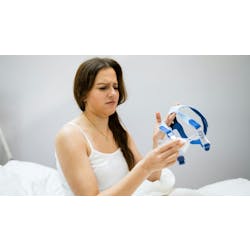The `temps` are on the loose, taking advantage of a flexible lifestyle
Cathy Hester Seckman, RDH
Every dentist gets the call sooner or later. Dr. Bob answers the phone on Sunday morning and Hygienist Sue is on the other end. She sounds miserable and shaky. "I won`t be able to work next week, Bob. I sprained my ankle. My doctor says bedrest and therapy."
What can Dr. Bob do? At one time, he would have had to rush to the office and spend a harried Sunday afternoon trying to cancel Monday`s hygiene patients. Today, if he`s lucky enough to have one in the area, all he has to do is call the temp agency and arrange for a fill-in hygienist.
Temporary work is a growing trend with a bright future in dentistry. As it becomes commonplace, even in small towns, more and more hygienists are asking, "How can temporary work benefit me?"
The advantages of temp work are the same ones that drew us all to hygiene originally - flexibility and good wages. The combination is hard to beat. Sometimes it takes a lot of looking, but a hygienist can usually find a well-paying job that fits around a personal lifestyle.
Suppose you have children. If you need a full-time job with benefits, you`ve got it. When the kids are small, you can drop back to part-time and still make enough to pay the baby sitter. When the kids get to high school, you can search for odd working hours that allow you to attend ball games and field trips. When it`s time for college, you can resume full-time work to pay those tuition bills.
Suppose you don`t have children. You can find middle-of-the-week jobs that allow the luxury of long weekends, or you can look for 12-hour days that let you have full days off while still working full-time. Working part-time in several offices, it`s easy to juggle vacation schedules.
Temp work allows even more flexibility. Want to take the summer off? No problem. Need some quick cash to retire a bill? Just ask for more days. Does your spouse work shifts? Maybe your temp agency can schedule similar shifts.
Temp agencies normally do not charge the hygienist a fee for placement, but they do charge the dentist. At most offices, this isn`t a problem because the employers realize they`re paying for the reliability, dependability, and professionalism of the agency - not to mention the convenience of staff and patients.
The feedback I`ve gotten personally from offices where I`ve temped has generally been one of relief. "You really saved my butt today," one colorful dentist said.
An office manager shrugged her shoulders over the problem of finding permanent help. "It`s so easy to just call Lisa for a temp now. We`ve never been disappointed. You don`t know what a relief it is to schedule prophys and know I won`t have to cancel two weeks later. Since we have this option, we`ll be able to take our time and find the right permanent hygienist."
Looking for the right image
If you`re thinking of taking on temporary jobs, your first question should be, how does a temp service work? Typically, a hygienist contacts the agency and requests an interview.
Wally Gardner, owner of DenTemp in Memphis, Tenn., explains their procedure: "We`ve developed a behavioral interview in which we complete an analysis of the technical and soft skills required. We can verify technical skills through previous employers and also do an ongoing evaluation with employers we send the hygienists to."
By soft skills, he means things like commitment to the task and interaction with patients. Prospective hygienists are given examples of problems, such as encountering a difficult patient, and they are asked, "How would you handle this?"
"If they don`t have the skills," Wally Gardner says, "We choose not to have them work."
Occasionally, a hygienist is turned down by a temp agency. At RDH Temps in Boston, Mass., owner Diane Zack reports she would refuse to place a hygienist who appeared unkempt at the initial interview. "If her evaluation did not seem appropriate, or if her credentials or references didn`t check out, we would turn her down."
One agency admits turning down a hygienist because of her teeth. "She had a nine-millimeter overjet," the owner said, "and some perio problems. I tried to be open-minded about it, but the dentists I sent her to simply did not want her representing their office to the patients. I couldn`t blame them."
The process at other agencies is similar. After filling out forms, signing a release of liability statement, and going through a license check, hygienists are ready for assignments.
Agencies also screen prospective dental offices closely. At Dental Directions Inc. in Arlington, Texas, Vicki Turner reports two reasons for refusing services to an office:
- An obvious neglect of OSHA regulations, rendering it an unsafe workplace.
- Inadequate time is allowed for the hygienist to serve the patient.
The agency acts as your agent
The next step is to schedule the hygienist at an office. Turner said that, at Dental Directions, scheduling is done "according to the needs of the hygienist. If our hygienists request certain days, hours, or driving distances which they would like, we try to schedule accordingly."
Other temp agencies have similar policies. "The hygienists pick and choose," says Zack, "and they can work as many as 40 hours a week."
When a dentist calls the temp agency for help, agreements are made about the hours to be filled and the salary to be paid. Temp agency owners try to negotiate the best daily rate possible. The dentist pays a fee for the service.
Information given to the hygienist might include a phone number and directions to the office, requested arrival time, time allowed per patient, scheduled break time, and name of a contact person. No agency contacted for this article charges a fee to the hygienist for placement.
Typically, the hygienist is paid by the dentist at the end of the day. Taxes are not taken out at that time. Also, a hygienist who works under this system is responsible for her or his own liability insurance.
Some taxing questions
Every hygienist who works temporary jobs, whether through an agency or on her own, should be informed about tax laws. As Marilyn Cortell of Boston, former owner of Medident, puts it, "You`re responsible for yourself in terms of taxes. It is incumbent on you."
The temp hygienist is considered an independent contractor. That means she is responsible for any taxes to be paid, not the employer/dentist. According to the Internal Revenue Service, the question of whether a worker is an employee or an independent contractor depends on the facts of each situation.
"Under the general rule," the IRS says, "the individual will be treated as an independent contractor if the business that pays for the services only has the right to control or direct the final result of the work and not the means of accomplishing that result. A worker who performs more than de minimis services for a number of unrelated persons or firms is generally an independent contractor."
Robert Gardner of East Liverpool, Ohio, a certified public accountant, explains the responsibilities of independent contracting: "If the total you earn from a dentist is $600 or more in a year, he or she has to report it to the IRS and give you a 1099 tax form. If he or she pays you less, they`re not required to tell the IRS, but it is still taxable income to you.
"Now, you may work in 10 places, for $300 each, and none of them gives you a 1099. But if you`ve taken in $3,000, the income you have to report to the IRS is the full $3,000, whether you get a 1099 or not. You might think, if the government doesn`t know about this, I`m going to forget it, but someday one of those dentists may get audited by the IRS.
"And when that happens, they know your name. They have the information. And in the age of computers, they can match it up. The IRS is always looking for more sources of income. You have two choices. Keep track and put the income on your tax return; or cheat, not report it, and hope none of those dentists ever get audited to the point that the IRS looks at you."
To report income from temporary work, the accountant says, you simply make a list that includes the date, name of the dentist and amount earned. "That`s all you have to keep for your taxes. Write it on the form as `Miscellaneous dentists, $1,400,` or whatever it was. Chances are it`ll never be questioned."
Some agencies, including DenTemp, act as an employer of the hygienist, handling payroll themselves rather than letting the dentist do it.
"We have a time card system of payment," Wally Gardner said. "When we send a hygienist out, she takes a card with her and fills it out for each completed assignment. Someone in the office signs off to confirm it. The top copy is left with the office, and the hygienist presents the other copy to us for payment. When we get the time card, the payroll is processed and we pay the hygienist. We then invoice the dentist, and he pays us. We do all takeouts, and we have blanket liability."
Filling the need of `help wanted` signs
More and more hygienists and dentists, even in small towns, are finding that a temporary arrangement works well for them. Lisa Chronister of East Liverpool, Ohio, founded Smilecare two years ago knowing that she would be the first to offer temporary hygienists and assistants in a mostly rural community.
"I sell the idea that my hygienists are well-trained, experienced, dynamic individuals. Once dentists use my service for the first time - once they find out I really can deliver a professional, they`re happy to use a temporary."
Cortell had a similar experience when she founded Medident in 1978 with partners Judy Tedesco and Sunny Adler. "We pioneered the temp hygienist in Boston. Very often, because the position and agency were new, we found ourselves almost selling the person that we had available."
Cortell started her business when her mother became ill. "I was working three days a week and was unable to get anyone to fill in for me. Dentists liked the idea of a temp hygienist right away, but they didn`t like the placement fee." Cortell was in business for 15 years, supplying both dental and medical personnel.
"There were dozens of hygienists working at the peak. We had 50 people working in a day."
Chronister, who works part-time as a hygienist herself, started slowly with Smilecare. She spent hours on the phone, working hard to present her ideas to dentists and hygienists. Some days she places only one hygienist. On a recent banner day, she placed 12. Sometime in the coming year, she plans to hire her first office employee.
"It`s catching on," she says proudly. "I`ve had little to no bad experiences. Everybody`s pretty much happy, passing the word along."
Zack opened her office, RDH Temps, 16 years ago in Boston because she was overworked. "I was a hygienist and office manager in a perio practice. Our assistant came down with mononucleosis, and we had no place to turn. I ended up doing all three jobs. I saw a need and went out there."
RDH Temps suffered through the 1988-92 recession, losing almost half its business, but has recovered nicely. "We work hard here," Zack said. "It`s a very good business."
DenTemp in Memphis typically places 30 hygienists a day, as well as dentists, assistants, lab technicians and office personnel. Gardner, who is not a hygienist but has a background in personnel and human resources, hopes to expand his business nationwide within a year.
Forever wandering
Some hygienists use a temp agency as their sole source of employment. "We have hygienists who work for us permanently as temps," Gardner says. "They can take a day off whenever they want, and I just send someone else."
If temp work loses its appeal, agencies are still a good place to look when seeking a traditional job. Turner at Dental Directions reports the growing trend of the "working interview," in which a temp hygienist commits to an office for a period of time in order to get to know the office. "This is definitely a two-way street," she says, "allowing the office to also become acquainted with the applicant in a daily work situation."
Supplying temp hygienists, agency owners agree, is an idea whose time has come. "It`s definitely a growing thing," said Zack of RDH Temps. "It gives the hygienist an autonomous feeling of being in control and independent." The future of the trend, she believes, can only be predicted as "healthy growth."
This can only be good for the hygienist, as it opens new opportunities for experience and employment.
Cathy Seckman, RDH, switched from dental hygiene to a career in journalism, but she is now temporary hygienist living in Calcutta, Ohio.
Everything you need is `in yonder`
What should you expect the first time you go to a temp job? Butterflies in your stomach, for one thing. It`s not easy to walk into a strange office, pick up a scaler, and start working. It takes confidence, a sense of adventure, and a willingness to adapt.
I`ve temped for at least a dozen different offices in the past year with Smilecare, and I have learned a lot. The first rule is to get there early. This gives you time to "get lost" on the way, as well as giving both you and the office personnel a chance to get organized. Sometimes, seeing a hygiene room for the first time, your mind goes blank, especially if you`re nervous.
It`s a good idea to keep a short list of things to look for, then check through the list with the assistant. It doesn`t make a good impression on the first patient when you`re halfway through the procedure and realize you don`t know where the floss threaders are kept.
Turn everything on and make sure it works. I`ve been in operatories that were not used regularly because the office was between hygienists. In one, the slow speed handpiece hose had a bad air leak, and in another, the ultrasonic scaler wasn`t putting out water because of a plugged line. In still another, the X-ray unit was dead, and we didn`t find out until the first patient had a bitewing in her mouth.
It`s necessary to be flexible about what you require. Once I walked into an operatory and couldn`t find a bracket tray.
"A what?" the young assistant asked blankly.
"Where can I lay out my instruments?"
"Oh, we just use these." She pulled a paper towel off a roll and laid it on the counter next to the sink.
At another office, a stack of trays was made up in advance with sterilized instrument packs, prophy angle and paste, floss, saliva ejector and 2x2s. "How efficient," I thought, opening the first pack. It contained a mouth mirror, a furcation explorer, and an anterior curette.
If you`re very particular about instruments, Diane Zack of RDH Temps suggests taking your own. "If you like specific instruments, bring three or four sets. There`s also an issue as far as sharpening goes. I wouldn`t want a temp coming in and possibly ruining my instruments, and I wouldn`t try to sharpen anyone else`s."
Every office has its own style. Start slowly, and take your cues from other employees.
At one office, the staff seemed to be very subdued, and there was minimal interaction with the patients. I used my best professional demeanor and spoke only when necessary. I learned later that the dentist is a very controlled, private individual who doesn`t like staff members to talk about personal things with the patients or each other.
At another large, busy office the assistants and hygienists talked constantly as they zipped through the hallways and in and out of the rooms. One made a comment at lunchtime: "You`re kind of quiet, aren`t you?" That afternoon, I made an effort to be more chatty.
The best advice for working as a temp is not to be afraid to try it. It`s fascinating to visit different offices and see how they handle things. Very often, you`ll come back to your regular office with new ideas and a fresh perspective on your profession.
- Cathy Hester Seckman, R.D.H.





